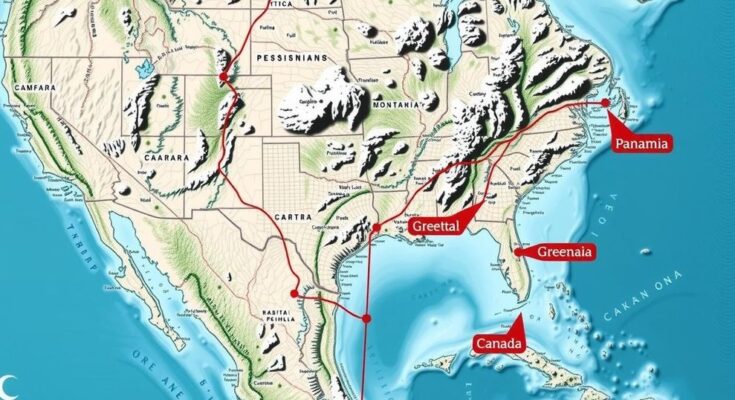President-elect Donald Trump is considering proposals for American territorial expansion, including the annexation of Canada, regaining control over the Panama Canal, and acquiring Greenland. His comments reflect a blend of serious policy intentions and attention-seeking provocations. International leaders have responded, affirming their control over these regions. The implications of such remarks pose complex challenges for U.S. foreign relations under Trump’s administration.
In a recent series of remarks, President-elect Donald Trump has sparked discussions surrounding the potential expansion of United States territory, likening such proposals to historic acquisitions like the Louisiana Purchase and the purchase of Alaska. Throughout the week, he has suggested the possibility of making Canada the 51st state, expressed interest in regaining control over the Panama Canal, and renewed his previous pursuit of acquiring Greenland from Denmark.
Trump’s statements reveal a blend of serious policy intentions and theatrical provocations designed to garner media attention and rally his supporter base. He has explicitly implied that America could take back control of the Panama Canal, currently managed by Panama, unless the country renegotiates fees charged to American vessels using the waterway. “So to the officials of Panama, please be guided accordingly,” Trump cautioned during a recent appearance.
Furthermore, Trump’s references to acquiring Greenland as a necessity for national security purposes echo the historical doctrine of Manifest Destiny. Similarly, his assertion that the Panama Canal is a vital national asset mirrors his overarching “America First” agenda. He has also reiterated his stance on classifying drug cartels as foreign terrorist organizations, potentially paving the way for military interventions that could violate Mexican sovereignty.
The transition team has not verified whether these statements are indicative of genuine strategic ambitions or are mere rhetorical devices. It is evident that Trump’s interest in the Panama Canal may correlate with broader trade concerns, particularly given his administration’s anticipated imposition of tariffs on foreign goods.
Trump’s comments have provoked responses from international leaders, with Panama’s President José Raúl Mulino asserting ownership of the canal is “not negotiable.” Mulino emphasized that the canal has been effectively managed by Panama since its turnover by the United States in 1999, highlighting the profits generated for the national economy. Additionally, Denmark’s Prime Minister Mette Frederiksen has dismissed Trump’s previous Greenland proposal, reiterating that the territory is not for sale.
The topic of American expansionism has historical roots, notably associated with the 19th-century doctrine known as Manifest Destiny, which asserted that the United States was destined to expand across North America. Trump’s recent remarks connect to this theme, suggesting a modern interpretation in the context of current geopolitical issues. The Panama Canal, once controlled by the U.S., has been a focal point of international relations since its handover to Panama in 1999. Greenland, a territory of Denmark, has similarly captured interest due to its strategic location and natural resources. Trump’s emphasis on these regions reflects his administration’s America First policy, which is predicated on prioritizing U.S. interests on the global stage.
In conclusion, President-elect Trump’s recent comments regarding the potential acquisition of the Panama Canal, the annexation of Canada, and the purchase of Greenland reaffirm his administration’s America First philosophy and raise questions of national policy. While his statements may serve to energize his political base and attract media attention, they have also triggered significant international responses, illustrating the complexities of U.S. foreign relations. Ultimately, whether these remarks signify serious intentions or playful provocations remains uncertain, but they undoubtedly seek to position Trump as a decisive leader on the world stage.
Original Source: www.cnn.com




